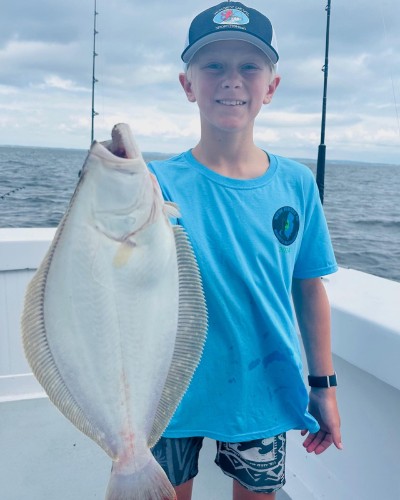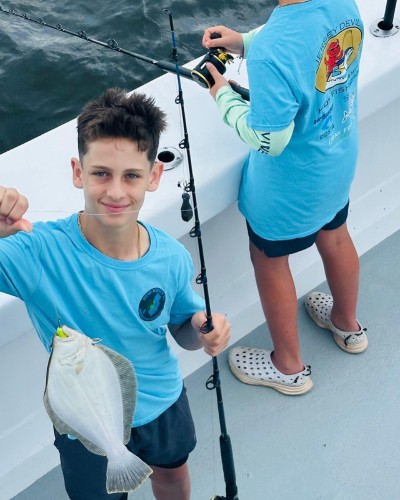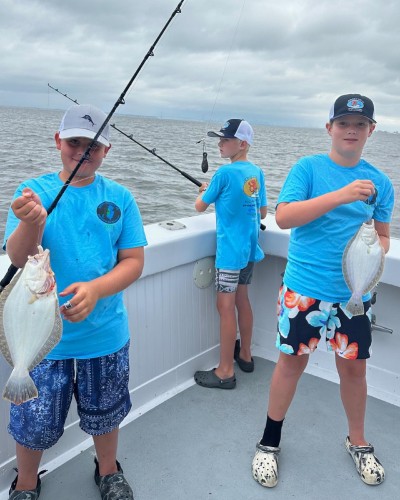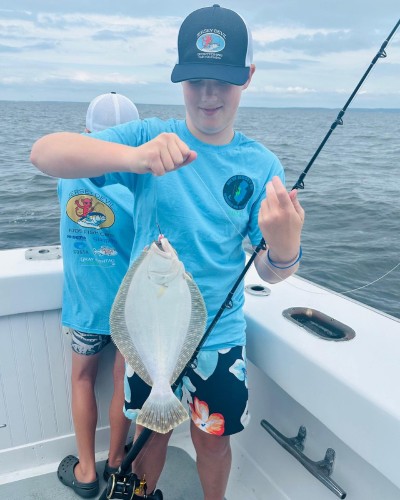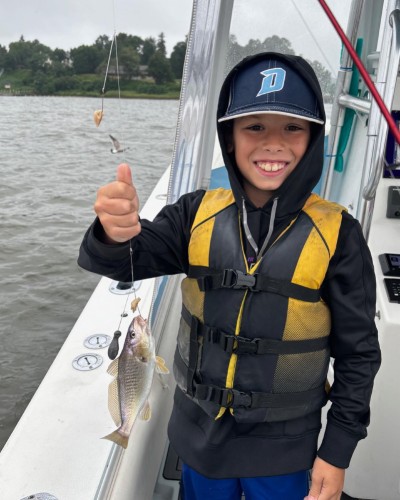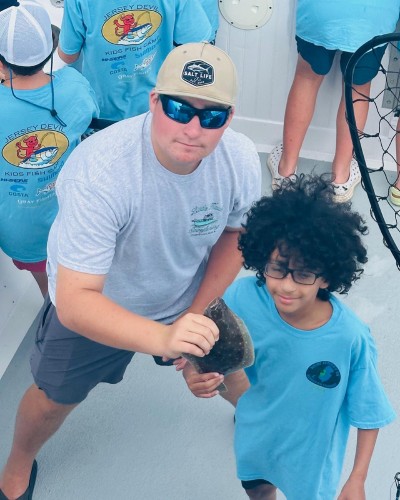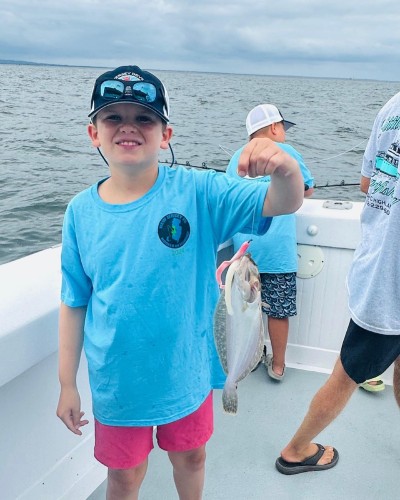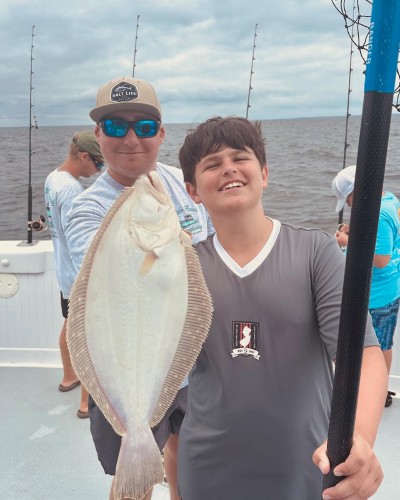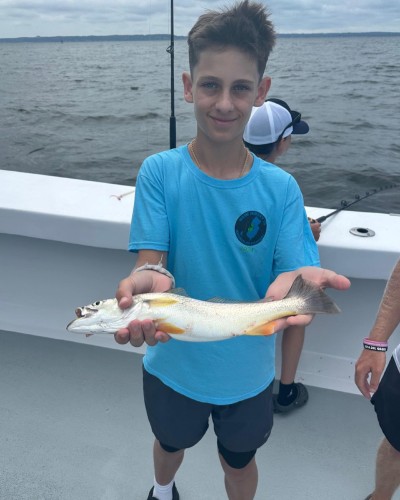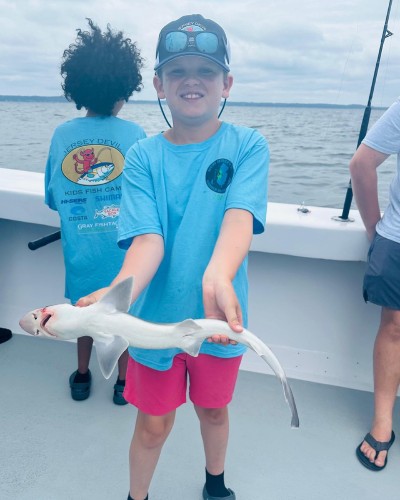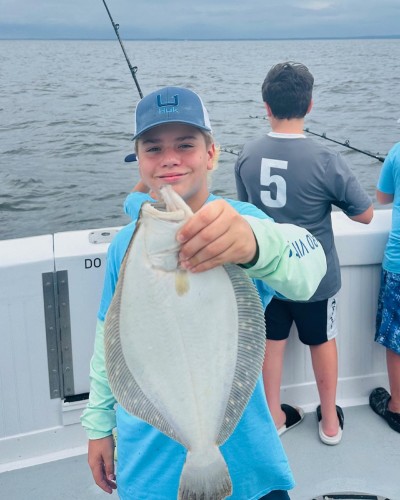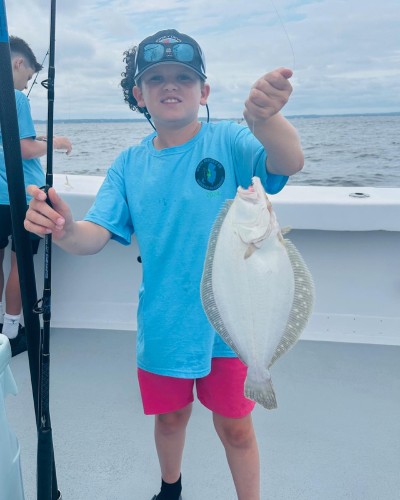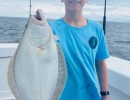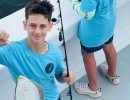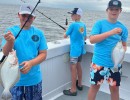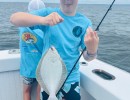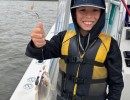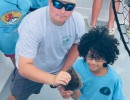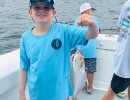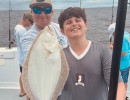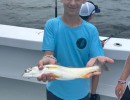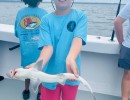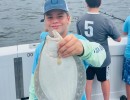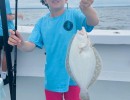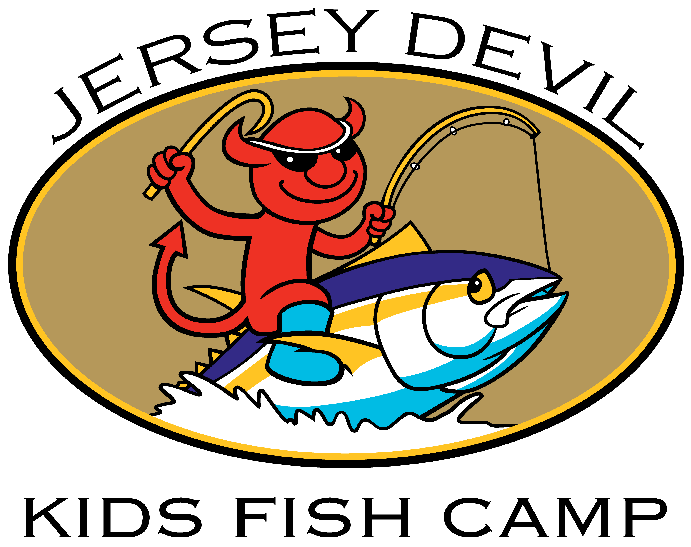Yamaha Pro Staffer Brian Rice’s Program Introduces Children to Fishing
Fair Haven is a quiet New Jersey town situated on the southern shore of the tidal Navesink River. It’s a stone’s throw from Sandy Hook, Raritan Bay and the Atlantic Ocean, where all manner of gamefish reside. The area offers some of the best coastal fishing in the Mid Atlantic region. Where should parents in the area look if their kids are ready to try fishing?
Enter Captain Brian Rice. Rice, a Fair Haven resident, is a successful businessman and charter captain who specializes in light tackle fishing for the area’s abundant striped bass. He also takes his clients bottom fishing and on occasional jaunts offshore for tuna. Rice runs the Jersey Devil, a highly recognizable Yamaha-powered 31-foot Contender® center console. He’s been associated with Yamaha for more than a decade and is a member of the pro staff team for companies including Shimano® fishing tackle and Costa del Mar® sunglasses. He’s well known in the New Jersey fishing community and active in local conservation and civic groups.
Rice and his wife Jacquie have two children, Jack and Cameron, who’ve grown up boating and fishing. Jack has been an avid angler since he was tall enough to barely reach over the gunwales of his dad’s boat with a fishing rod. He caught his first tuna at age five and is the envy of many kids in the area because his dad frequently takes him out on the water.
A funny thing happened a few years back when an acquaintance asked Jacquie if there was a place in the area for kids to learn about fishing. After she talked to Rice, they realized there was no resource aimed at saltwater fishing instruction, so they started brainstorming about how they might create one.
“I became aware of a program called ‘Hooked on Fishing, Not on Drugs’ that was initially created by the Future Fisherman Foundation and administered by the State of New Jersey,” Rice said during an extensive interview. “Its goal is to introduce children to fishing and the outdoors as a healthy alternative to getting involved with drugs, gangs and other dangerous behaviors. I attended a certification course and became accredited as an instructor, but also realized resources to help put together a fishing school based on the HOFNOD program were limited. I worked with Liz Jackson, the HOFNOD coordinator at the NJ Department of Environmental Protection, but their basic program was inner city, freshwater fishing oriented. So I was pretty much on my own trying to establish a program centered on saltwater fishing in a more suburban setting.”
Rice developed a curriculum for what would eventually become the Jersey Devil Kids Fish Camp. Rice’s father owns a house on the Navesink River where the Jersey Devil is kept on a lift between charters. It’s right next to the Fair Haven town dock. The dock was built and is maintained by the town recreation and parks department. It’s a pier that extends out into the river providing a place where residents can fish, catch crabs or just enjoy the view. Rice realized it was the perfect place to host the camp, as it would give him access to his charter boat and garvey, which they would use during some of the camp fishing sessions. With a little prodding, he was able to get permission from the town to use the facility to host the camp. On days when the weather is inclement, classes move indoors, courtesy of the Fair Haven chapter of the Knights of Columbus, which allows him to use their meeting rooms in a nearby building.
The initial concept for the camp was simple. The course would be one week of intensive instruction and fishing held on the town dock from 8 a.m. until early afternoon, with the exception of the hours spent on the Jersey Devil with groups of six kids at a time. The entire camp would also spend a full day aboard the Little Hawk, a large charter boat out of nearby Atlantic Highlands Municipal Marina.
The course teaches the basics of fishing, from tying knots to casting and fighting fish. It covers fishing in the tidal rivers and from the surf, boats and kayaks. In addition, the kids who attend learn about conservation and the local marine environment. There’s a senior camp director on sight each day who is a licensed captain, along with volunteer counselors and counselors-in-training (CIT) who act as instructors and oversee fishing periods. CIT volunteers are teenagers drawn from local middle and high schools as well as civic and church organizations. Quite a few come to the program from the prestigious Marine Academy of Science and Technology on nearby Sandy Hook, and all receive special credits from their institutions for their volunteer work over the summer.
The camp had its official launch in 2014 with one group of 12 kids. Parents gave positive feedback, and several told Rice that their kids were transformed as a result of their time at the camp. The following year, Rice expanded the camp to two weeks as he struggled to get enough time off to be there and search for reliable help to make further expansion possible. Through word of mouth and persistence, he was able to double the camp to four weeks the following year and to six weeks in 2019. To date, the camp has over 200 graduates.
“Each camp session hosts a dozen kids, all pre-registered sometimes months in advance with written permission from their parents,” Rice said. “There’s a modest fee that helps offset the cost of running it, and donations from camp sponsors like Shimano®, Yamaha, AFW® Fishing Brands, Tsunami® Tackle and the NJ HOFNOD program help make it possible. This year, we tried to filter the kids by age for each session, breaking them into ten-year olds the first and last week (10 is the minimum age), 11-year olds the second, 12-year olds the third, 13-year olds the fourth and 14-year olds the fifth. It worked out well, although we couldn’t avoid some mixing of age groups. Each camper received his or her own new rod and reel courtesy of Shimano®, line from AFW® Fishing Brands and hooks, rigs and terminal gear from Tsunami® Tackle.
“We’re still affiliated with and receive a modicum of support from the State, including help with liability insurance under their umbrella policy to augment coverage of our own. Our camp program strays a bit from the traditional HOFNOD approach, which is usually one day a week for a dozen or more weeks. We run a more targeted program on consecutive days. That way we can immerse the kids in learning and actual fishing. We augment those experiences with classes on conservation and the amazing outdoor environment that they have nearby.”
“It’s been eye-opening and gratifying to see the positive impact the camp has on these kids,” said Rice. “Letters and calls from parents have confirmed that it carries over to their home life, their social interactions and even their behavior in school.”
The first morning we went to observe the camp we bumped into Jill Kruger, the mother of two sons, Dillion and Jack, who were attending the session. She was also dropping off two of their friends, Jack and Will. She was effusive about the camp and its impact on the boys.
“My sons absolutely love it,” she said with great enthusiasm. “They talk about it at home almost constantly, and want to go fishing on their own to try out what they’ve learned. It’s really the highlight of their summer, and it impacts how they spend the rest of their time off from school in more productive ways. I even brought my nephew from Connecticut last year to stay with us so he could go to fish camp, too. They don’t have anything like it near his home. They’re all looking forward to learning enough to become CITs in the future, but most of all I’ve see them mature in ways I would never have imagined as a result of this program. I can’t thank Captain Rice enough for working so hard to build it.”
It was immediately obvious that the kids revel in being outdoors, in learning about things like the varied marine life in their local waters, the importance of protecting that environment and conserving marine resources and habitat. They were catching snapper bluefish right from the town dock and learning to use a seine net along the shore to catch bait and see the various species of juvenile fish that depend on this tidal estuary as a spawning area and nursery.
Rice introduced us to Captain F.J. (Felice Joseph) Lentile, one of the program’s senior counselors and captains who is in attendance every day. Since this was boat fishing day, he ran Rice’s Yamaha-powered Jersey Devil Contender®for two-hour sessions on the river, carrying six campers each time to give them the opportunity to experience what it’s like to fish from a center console boat. CIT Spencer Torine accompanied him, while two of the CITs assisted the remaining campers as they practiced casting and fishing from the pier. Another CIT accompanied a camper who wanted to try fishing from one of the camp’s kayaks, paddling alongside him for the hour they were on the river together. Safety was the primary concern at all times. Everyone on the boats or in the kayaks wore appropriate flotation devices, and camp staff supervised them throughout the day.
The following week we returned to join a different group of campers for their half-day fishing trip aboard the Little Hawk, a 52-foot sportfisherman licensed to carry groups of up to 17 people, on a trip through Raritan Bay to fish for summer flounder, known locally as fluke. The group fished under the supervision of Rice and two camp counselors in addition to the boat’s skipper, Captain Joe Occhipiniti, Jr., and his mate. The group was comprised of 14-year-old kids, and the tall gunwales surrounding the cockpit provided a safe environment for the group to fish under five sets of watchful eyes.
The sky was cloudy, but the seas were calm and the five hours of fishing that followed were pleasant. As soon as the boat stopped at the first spot the kids started hooking fish and the action rarely slowed down long enough for the mate and counselors to take a breather. Kids netted fish, measured them to see if they were over the legal size to be retained and if not, they gently released them. There were even a few nice keepers caught for the young anglers to bring home to their families for dinner. During each move to a new spot, the campers moved into the safety of the cabin to eat snacks and talk with their newfound friends.
On the way back to the slip, we joined Rice in the wheelhouse with Captain Joe, who was the first to tell me how much he enjoyed taking the groups of campers out each Wednesday morning.
“Watching kids’ eyes light up when they get on board and start fishing is one of the great joys of this job,” he said. “Charter and party boats like the Little Hawk are frequently the first boat newcomers get to fish aboard, but it’s special being involved with Rice’s kids. He’s doing a great job of bringing new generations into the sport.”
Liz Jackson, who runs the HOFNOD program at NJ DEP, echoed Joe’s sentiments. “Our job is to help people who want to help kids learn to fish and, to a degree, nursemaid them though the process of getting started until each program becomes self-sustaining,” she said. “Rice came to us for those reasons and put a lot of his own time and money into getting his vision started. He got early buy-in from his community and lined up a few sponsors that provide some of the needed gear and a little financial support, which is a testament to his abilities. In a very short time, his efforts exceeded the goals of our program, even with the personalized ways he tweaked our program to better fit his area and his kids. We will always be in his corner as he continues to grow the Jersey Devil Kids Fish Camp.”
Looking down from the bridge of the Little Hawk we asked Rice why he has put so much effort into the camp.
“For me, it’s a way to give back to the sport that has meant so much to my family for generations,” he said. “My father taught me to try and leave the world a little better place than I found it, and I couldn’t think of a better way than teaching kids to fish and enjoy the outdoor opportunities they have, even living so close to the largest city in the country. The fishing here is truly remarkable and through learning about it, these kids are also learning to appreciate the environment. That leads to a vested interest in wanting to protect it. I’ve seen the difference it’s made in the kids that have attended the camp, I’ve heard it from their parents and I can see this is the future of fishing. The more I can grow the camp and get companies in the tackle industry to support projects like mine, more young fishermen will come up through the ranks. It’s in everyone’s best interest.”
Rice would like to thank Yamaha, Shimano®, Tsunami Tackle®, AFW® Fishing Brands, Costa del Mar® and especially the NJ DEP HOFNOD program for helping him get the Jersey Devil Kids Fish Camp off the ground and for the camp’s continued growth. His goal is to continue to increase the camp’s capacity and to find ways to expand it to new areas. For more information you can follow the program on Facebook®: Jersey Devil Kids Fish Camp or email him at

